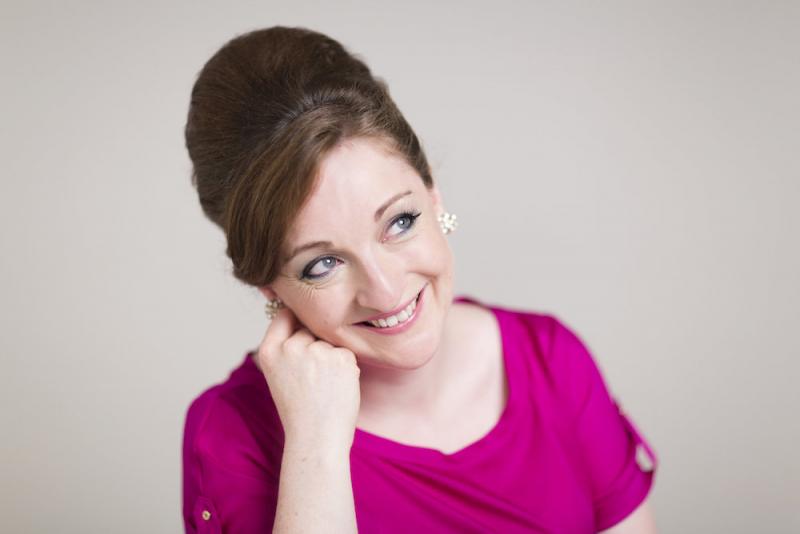Tynan, Appl, Burnside, Wigmore Hall review - the music of domesticity explored in song | reviews, news & interviews
Tynan, Appl, Burnside, Wigmore Hall review - the music of domesticity explored in song
Tynan, Appl, Burnside, Wigmore Hall review - the music of domesticity explored in song
Wide-ranging duet recital covers the joys and trials of home and family

The first visual impression of Monday’s Wigmore Hall song recital was of the marked height difference between Irish soprano Ailish Tynan and the willowy baritone Benjamin Appl. But as they warmed to their task, their voices, which initially seemed an unlikely pairing, grew on me, whether in solo or duet numbers.
The concert, part of the Wigmore’s “Sense of Home” festival, and celebrating of 25 years of their learning programme, looked at family and home life through 25 songs, broken down into four sections. “Where the heart is”, about thoughts of home, “On the road again”, exploring leaving home and going into the world, “Family Values”, looking at the intimate details of family life, and “Bricks and Mortar”, where the physical buildings that make a home are imbued with mystical power. The second was the least successful, and the least integrated with the theme, but even then had one of the individual highlights: Brahms’s haunting “Evening Rain”.
There was a scattering of duets, although these were not always the best bits of the evening. Schumann’s “Family Portrait” is poignant, depicting a couple reminiscing in old age in a way denied to Robert and Clara. In this, and in John White’s delightfully quirky “Houses and Gardens in the Heart of England”, there were some theatricals, Appl and Tynan playing out a contented, or less than contented, couple. But the other duets included the twee Hely-Hutchinson setting of “The Owl and the Pussy-cat” and a soapy arrangement of the American folk-song “Ten Thousand Miles Away”, were less successful. Appl (pictured above) was solidly on home turf in Schubert, and in Brahms’s “Ah! if I but knew the way back” he moved from a dark-coloured opening, flowering in the middle section before flipping again on a sixpence on the line “I seek happiness in vain”. He also achieved a similar twist-in-the-tail in Charles Ives’s revelatory “Tom Sails Away”, with its haunting last line: “Scenes from my childhood are floating before my eyes”.
Appl (pictured above) was solidly on home turf in Schubert, and in Brahms’s “Ah! if I but knew the way back” he moved from a dark-coloured opening, flowering in the middle section before flipping again on a sixpence on the line “I seek happiness in vain”. He also achieved a similar twist-in-the-tail in Charles Ives’s revelatory “Tom Sails Away”, with its haunting last line: “Scenes from my childhood are floating before my eyes”.
Ailish Tynan started Elgar’s “Pleading” with a Vera Lynn-style swoop up to the first note, which may be authentic performance practice for Elgar, but sounds awkward today. There were similar scoops in Moeran’s “Twilight” but elsewhere Tynan sang with a more straightforward, cleaner attack, whether in Mendelssohn’s exciting “Song of Travel” or floating the virtuoso high notes at the end of Balfe’s “I dreamt I dwelt in marble halls”. Tynan was also excellent in the less mainstream material: Geoffrey Bush’s setting of Virginia Woolf, where the prose was never prosaic, Seóirse Bodley’s peculiar but moving Seamus Heaney setting “A Call”, and throwing herself with 100% commitment into Libby Larsen’s “Pregnant”.
The pianist Iain Burnside was subtle, sensitive and brilliant. His chirruping left hand in Schubert’s “The Recluse” and the rubato in the Moeran were perfectly judged, and he even got a two-word vocal solo – “I will” – as Edward Lear’s Piggy.
I wasn’t entirely sure how to think about the programme as a whole. On the one hand it was varied, and given the innate conservatism of Wigmore Hall programming, notably included music by a woman (!) and as many as three songs from the 21st century (and another nine from the 20th). On another assessment, this was still a very traditional recital looking at traditional themes through largely familiar music, and might have included some other, unheard or marginalised, perspectives. But these quibbles notwithstanding, this was a fine evening’s music by three performers at the top of their game.
rating
Explore topics
Share this article
The future of Arts Journalism
You can stop theartsdesk.com closing!
We urgently need financing to survive. Our fundraising drive has thus far raised £49,000 but we need to reach £100,000 or we will be forced to close. Please contribute here: https://gofund.me/c3f6033d
And if you can forward this information to anyone who might assist, we’d be grateful.

Subscribe to theartsdesk.com
Thank you for continuing to read our work on theartsdesk.com. For unlimited access to every article in its entirety, including our archive of more than 15,000 pieces, we're asking for £5 per month or £40 per year. We feel it's a very good deal, and hope you do too.
To take a subscription now simply click here.
And if you're looking for that extra gift for a friend or family member, why not treat them to a theartsdesk.com gift subscription?
more Classical music
 Classical CDs: Voice flutes, flugelhorns and froth
Baroque sonatas, English orchestral music and an emotionally-charged vocal recital
Classical CDs: Voice flutes, flugelhorns and froth
Baroque sonatas, English orchestral music and an emotionally-charged vocal recital
 Kanneh-Mason, Britten Sinfonia, Shave, Milton Court - a grin and a big beaming smile
A pair of striking contemporary pieces alongside two old favourites
Kanneh-Mason, Britten Sinfonia, Shave, Milton Court - a grin and a big beaming smile
A pair of striking contemporary pieces alongside two old favourites
 theartsdesk at the New Ross Piano Festival - Finghin Collins’ musical rainbow
From revelatory Bach played with astounding maturity by a 22 year old to four-hand jazz
theartsdesk at the New Ross Piano Festival - Finghin Collins’ musical rainbow
From revelatory Bach played with astounding maturity by a 22 year old to four-hand jazz
 First Person: Manchester Camerata's Head of Artistic Planning Clara Marshall Cawley on questioning the status quo
Five days of free events with all sorts of audiences around Manchester starts tomorrow
First Person: Manchester Camerata's Head of Artistic Planning Clara Marshall Cawley on questioning the status quo
Five days of free events with all sorts of audiences around Manchester starts tomorrow
 Goldscheider, Brother Tree Sound, Kings Place review - music of hope from a young composer
Unusual combination of horn, strings and electronics makes for some intriguing listening
Goldscheider, Brother Tree Sound, Kings Place review - music of hope from a young composer
Unusual combination of horn, strings and electronics makes for some intriguing listening
 theartsdesk Q&A: composer Donghoon Shin on his new concerto for pianist Seong-Jin Cho
Classical music makes its debut at London's K-Music Festival
theartsdesk Q&A: composer Donghoon Shin on his new concerto for pianist Seong-Jin Cho
Classical music makes its debut at London's K-Music Festival
 Helleur-Simcock, Hallé, Wong, Bridgewater Hall, Manchester review - moving lyricism in Elgar’s concerto
Season opener brings lyrical beauty, crisp confidence and a proper Romantic wallow
Helleur-Simcock, Hallé, Wong, Bridgewater Hall, Manchester review - moving lyricism in Elgar’s concerto
Season opener brings lyrical beauty, crisp confidence and a proper Romantic wallow
 Kohout, Spence, Braun, Manchester Camerata, Huth, RNCM, Manchester review - joy, insight, imagination and unanimity
Celebration of the past with stars of the future at the Royal Northern College
Kohout, Spence, Braun, Manchester Camerata, Huth, RNCM, Manchester review - joy, insight, imagination and unanimity
Celebration of the past with stars of the future at the Royal Northern College
 Jansen, LSO, Pappano, Barbican review - profound and bracing emotional workouts
Great soloist, conductor and orchestra take Britten and Shostakovich to the edge
Jansen, LSO, Pappano, Barbican review - profound and bracing emotional workouts
Great soloist, conductor and orchestra take Britten and Shostakovich to the edge
 Jakub Hrůša and Friends in Concert, Royal Opera review - fleshcreep in two uneven halves
Bartók kept short, and a sprawling Dvořák choral ballad done as well as it could be
Jakub Hrůša and Friends in Concert, Royal Opera review - fleshcreep in two uneven halves
Bartók kept short, and a sprawling Dvořák choral ballad done as well as it could be

Add comment